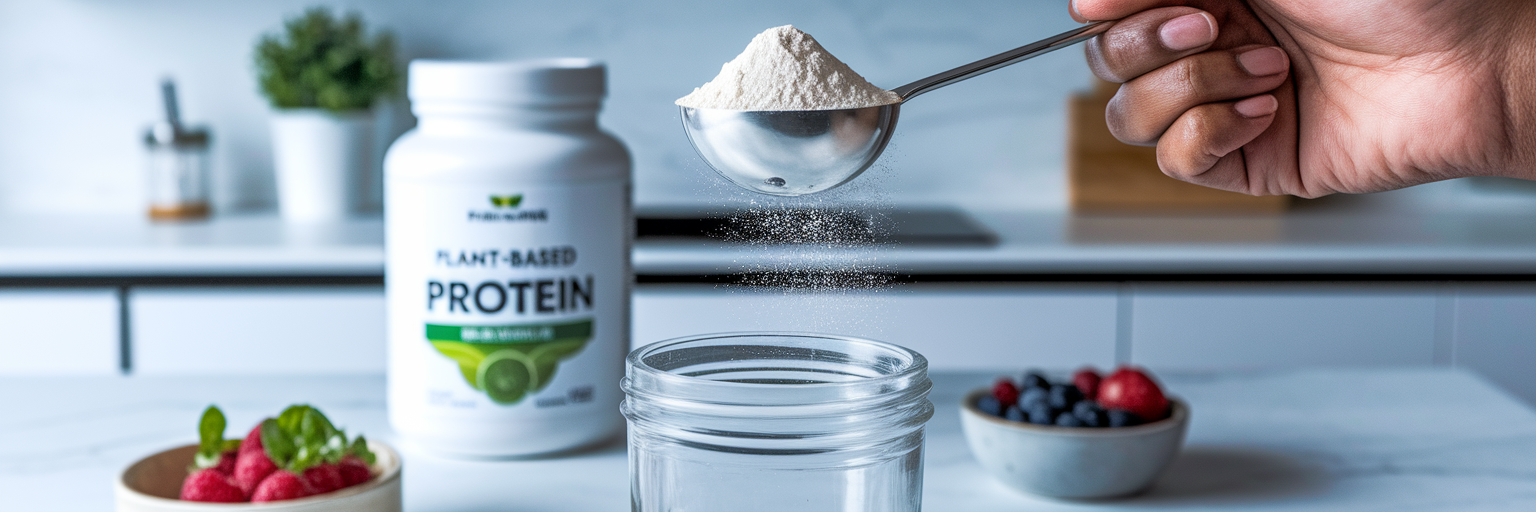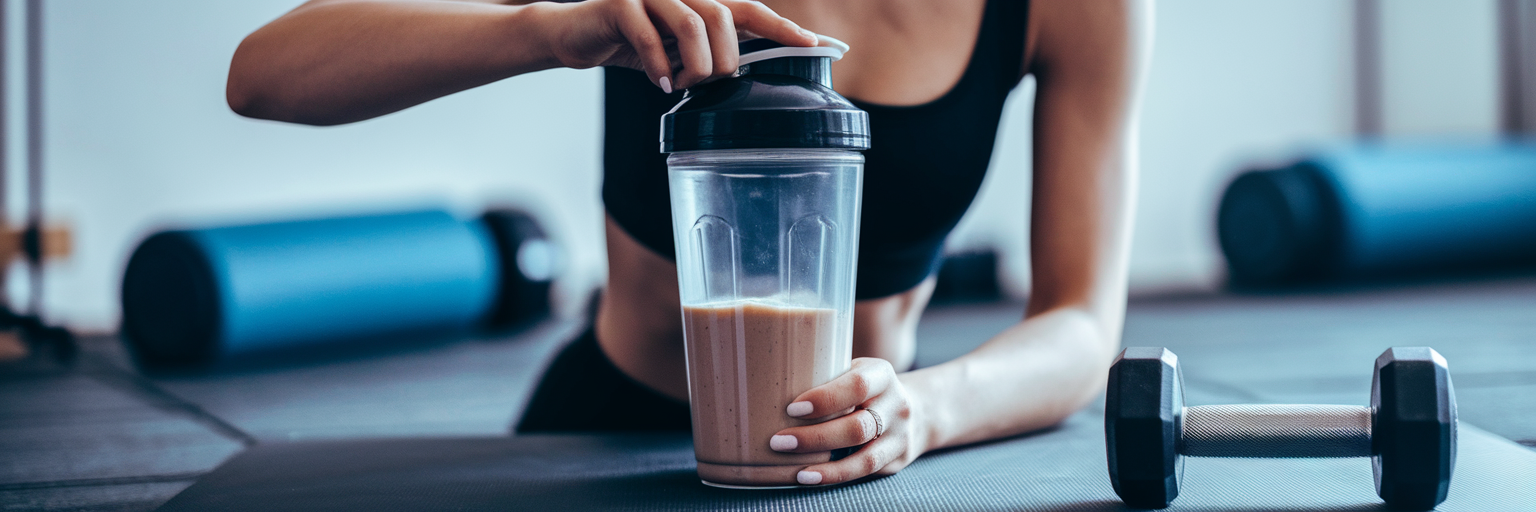Committing to a vegan lifestyle is a powerful choice for your health and the planet. While a plant-based diet is packed with benefits, it can sometimes create specific nutritional considerations for active individuals. This is where creatine monohydrate comes in, not as a complex chemical, but as a simple, naturally occurring compound that fuels your muscles.
Think of it as the spark plug for your muscle's engine during intense bursts of effort, like lifting weights, sprinting, or high-intensity interval training.
Why Creatine Is a Game-Changer for Plant-Based Athletes
Creatine is primarily found in animal muscle tissue. Because of this, people following a plant-based diet naturally have lower creatine stores in their own muscles. This isn't a drawback; it's actually an opportunity. When vegans begin supplementing with creatine, they often experience more noticeable improvements in strength and power compared to their omnivorous counterparts because they are starting from a lower baseline.
These vegan creatine benefits extend beyond just lifting heavier. By helping your muscles produce energy more efficiently, creatine can help you push out those extra one or two reps that truly drive progress. It supports enhanced workout capacity, allowing you to train harder and recover more effectively between sets.
But the advantages aren't limited to the gym. Your brain is a high-energy organ that also relies on creatine to function optimally. Some studies suggest that creatine supplementation can support short-term memory and mental processing speed. This makes it a fantastic dual-purpose tool for anyone looking to sharpen both their physical and cognitive performance. It’s not just a muscle-builder; it’s a key supplement for overall well-being on a vegan diet. For more insights into plant-based wellness, our blog offers a wealth of information.
Choosing a High-Quality Vegan Creatine

Let's clear up a common misconception right away: almost all creatine monohydrate you'll find on the market is synthesized in a lab, making it inherently vegan. The key is to choose a product that is pure, effective, and free from any animal-derived cross-contamination during manufacturing. This ensures you're getting a clean product you can trust.
Here’s what to look for on the label to make a smart choice:
- "Certified Vegan" Logo: This is your guarantee that no animal-derived ingredients were used at any stage of the production process. It’s a simple check for peace of mind.
- Micronized Creatine Monohydrate: This just means the powder has been broken down into smaller particles. The result is a finer powder that dissolves easily in water and is known for being gentler on the stomach.
- Third-Party Testing: Look for certifications like NSF for Sport or Informed-Sport. These seals of approval mean the product has been independently tested for purity and safety, assuring you that you are getting one of the best vegan fitness supplements US consumers can find.
While capsules are available, powders are generally more cost-effective and versatile, allowing you to mix them seamlessly into your daily shakes. For most vegan athletes, we recommend a high-quality micronized powder, like our own pure Creatine Monohydrate, as the ideal choice.
Perfecting Your Dosage and Daily Timing
When it comes to creatine, the secret to success is consistency, not complexity. Forget complicated protocols and focus on building a simple, sustainable daily habit. This is the foundation of learning how to take creatine vegan style for the long haul.
The Simple and Effective Daily Dose
The most straightforward and research-backed approach is to take 3-5 grams of creatine monohydrate per day. That’s it. The most important rule is to take this dose every single day, including on your rest days. This ensures your muscle creatine stores remain fully saturated, ready to fuel your next workout.
To Load or Not to Load?
You may have heard about a "loading phase," which involves taking around 20 grams of creatine daily for the first week to saturate your muscles more quickly. While this works, it is absolutely not necessary. The loading phase is also the primary reason some people experience side effects like bloating or stomach discomfort. By starting with the 3-5 gram maintenance dose, you will reach the same saturation point within a few weeks, just without the potential for digestive issues.
When Is the Best Time to Take It?
The honest answer? The best time to take creatine is the time you will remember to take it every day. Consistency trumps perfect timing. However, if you want to optimize, some research suggests a slight advantage to taking it post-workout. According to health and wellness resource Orgain, consuming creatine with carbohydrates and protein after exercise can enhance its absorption due to the insulin response. But don't stress over it. Whether you take it before your workout, after, or with your morning smoothie, the key is simply not to miss a day.
Pairing Creatine with Vegan Protein for Maximum Results

To get the most out of your supplementation, think of creatine and protein as a team. Creatine is the energetic "worker" that powers your workout, while protein provides the "building materials" your body needs to repair and grow muscle tissue afterward. Using them together creates the ideal environment for progress.
When looking for the best vegan protein with creatine, the goal is to choose a high-quality protein source that complements your fitness goals. Here’s a quick look at some popular options:
| Vegan Protein Type | Key Benefit | Why It Pairs Well with Creatine |
|---|---|---|
| Pea Protein | Rich in BCAAs | Supports muscle protein synthesis effectively. |
| Soy Protein | Complete Amino Acid Profile | Provides all essential building blocks for repair. |
| Brown Rice/Pea Blend | Balanced & Hypoallergenic | Offers a complete protein source that's easy to digest. |
Note: This table highlights common vegan protein sources. The choice often comes down to personal dietary preference and digestive tolerance.
The easiest way to combine them is to mix 3-5 grams of unflavored creatine directly into your post-workout protein shake. A delicious option like our Chocolate Vegan Protein shake, consumed within an hour of your workout, helps replenish your muscles and maximize nutrient uptake. If you need more inspiration, you can find plenty of ideas in our easy vegan protein recipes that can be adapted to include creatine.
How to Avoid Bloating and Other Common Pitfalls
The fear of creatine bloating vegan style is one of the most common concerns we hear, but it's also one of the easiest to avoid. Let's put this worry to rest with some simple, practical advice. As noted by health resources like Healthline, this issue is almost always caused by two things: starting with a high-dose loading phase or not drinking enough water. Creatine works by pulling water into your muscle cells, which is great for performance. But if you're not adequately hydrated, your body may retain water elsewhere, leading to discomfort.
Here are three simple steps to ensure a smooth experience:
- Skip the Loading Phase: We can't say it enough. Sticking to the 3-5 gram daily dose is the single most effective way to prevent bloating and stomach upset. Patience pays off.
- Hydrate, Hydrate, Hydrate: Make a conscious effort to increase your daily water intake. You don't need to overdo it, but aiming for an extra 16-32 ounces of water throughout the day can make a big difference.
- Choose a Micronized Powder: As we mentioned earlier, a micronized formula dissolves better. This improved mixability can also lead to easier digestion and less potential for discomfort.
Finally, let's address the myth about kidney health. For healthy individuals, decades of scientific research have shown creatine to be exceptionally safe for long-term use. Of course, if you have a pre-existing kidney condition, it is always wise to consult your doctor before starting any new supplement.
Achieving Long-Term Success with Creatine
The key to unlocking the full benefits of creatine is understanding that it's a long-term tool, not a quick fix. Unlike a pre-workout stimulant that gives you an immediate jolt, creatine's effects build gradually over weeks as your muscles become fully saturated. Managing this expectation is crucial for staying consistent.
To stay motivated, we encourage you to track your progress. Keep a simple workout journal and make a note of your lifts, reps, or how you feel during high-intensity sessions. Seeing those tangible improvements on paper is a powerful reminder that your daily habit is paying off.
Ultimately, creatine is a safe, effective, and incredibly beneficial supplement for plant-based athletes. By following these simple guidelines, you can make it a seamless part of your routine. For a personalized approach, consider speaking with a healthcare professional or a registered dietitian who understands plant-based nutrition. If you have any other questions, you can likely find answers on our FAQ page.



